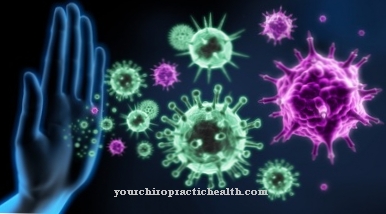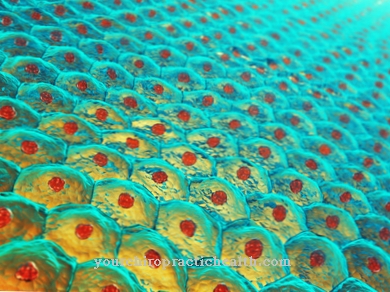The Epigenetics deals with changing gene activity without changing the DNA sequence of the gene. Many processes in the body are based on the processes of epigenetics. Recent research results prove their importance for the ability of the organism to modify in the context of environmental influences.
What is Epigenetics?

The term epigenetics describes changes in the activity of genes in addition to heredity (genetics). So that means that the genetic code of a gene is fixed, but not always applied. Epigenetics deals with changes in the genome function of DNA that are not caused by a change in the DNA sequence.
Every cell in a living being contains the same genetic program. However, in the course of its development there is a differentiation of organs and various tissues. For example, blood cells have the same hereditary information as kidney cells. Only different genes are active in the two types of cells. The differentiation of cells can be explained by epigenetic processes that manifest themselves through the activation or inactivation of genes.
Undifferentiated cells are so-called stem cells that can develop into a new, genetically identical organism through cloning. However, differentiated cells can also be converted back into stem cells by reversing the epigenetic change.
Function & task
After each cell division, epigenesis gradually changes genetic information within the cell. Certain genes are inactivated by DNA methylation.
Another option is to mark the DNA using what is known as histone acetylation. The two-meter-long DNA strand is unpacked in the tiny cell nucleus and marked at certain points. This guarantees that only the information relevant to the cell type is read. Both methylation and histone acetylation are controlled by biochemical agents.
Every organism, including humans, has many so-called epigrams. Additional genetic codes that determine the modification of the organism are considered epigrams. In the course of life, the organism changes more and more under the influence of the environment. The genetic code is retained, but external influences are becoming increasingly important.
Environmental influences include nutrition, stress factors, social contacts, environmental toxins or even experiences that are anchored in the psyche of the person. It is known that the body reacts to these factors and stores experiences in order to be able to react if necessary.
According to more recent findings, all interactions between the organism and the environment are controlled epigenetically. As a consequence, the external appearance (the phenotype), the character and the behavior are significantly shaped by epigenetic processes.
The different development of identical twins under different external influences shows how strong the imprint can be. Another example can be physical changes due to the change of the lived sex, which occur without administration of medication. The Albanian burrneshas (women who live the life of a man) include Testimony of it.
Some research shows that acquired traits can be passed on. The basic genetic code is passed on, but additional genetic changes (epigenetic changes) are also partially passed on to the offspring while maintaining the given DNA sequence of the genes.
Illnesses & ailments
The influence of epigenetics on the phenotype and human behavior is becoming increasingly clear. New research results point to the importance of epigenetic processes on human health.
For example, many diseases have a genetic preposition. They occur in families. Examples are diabetes mellitus, cardiovascular diseases, rheumatic diseases and dementia. Here the way of life plays a major role in whether the relevant disease breaks out at all. In identical twins, for example, it was found that Alzheimer's disease is very dependent on the environment despite its genetic preposition.
With epigenetics it was also possible to clarify why, for example, green tea is so healthy. The active ingredient epigallocatechin-3-gallate (EGCG) in tea activates a gene that encodes a cancer-preventing enzyme. In older people this gene is often methylated and therefore inactive. This increases the likelihood of developing cancer in old age. However, by consuming green tea, the likelihood of cancer decreases again.
In the realm of bees, for example, the queen does not differ genetically from the workers. But since she is the only animal to be fed royal jelly, she develops into a queen bee. With her, many dumb genes are reactivated due to a specific biological agent.
In humans, among other things, unfavorable social conditions often lead to personality disorders later. Today it must be assumed that many mental and psychological diseases are triggered by epigenetic processes. The human epigenome also stores trauma that later influences the personality structure.
New scientific studies have shown that many errors occur in the genome of traumatized people. After a successful therapy, however, these errors disappeared again.
There are also epigenetic changes that are passed on to the offspring and that make them genetically predisposed to certain diseases. In a Swedish human study, for example, the relationship between food availability and predisposition to disease in subsequent generations was examined.
The geneticists Marcus Pembrey and Lars Olov Bygren found that the male grandchildren of grandfathers who had a lot to eat were always prone to diabetes. Epigenetic changes on the sex chromosomes probably took place here.
Even traumatized people can pass on epigenetic changes to future generations. Further research in the field of epigenetics should help to uncover and reverse disease-causing epigenetic changes.



























